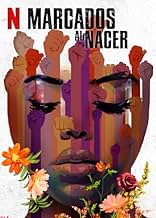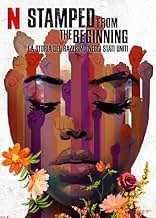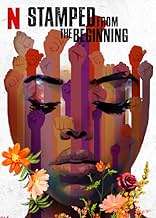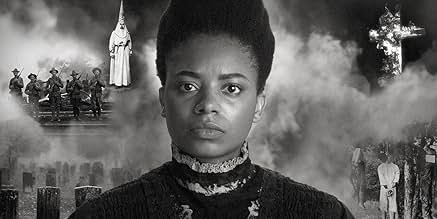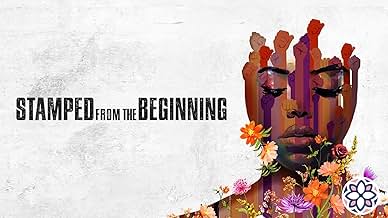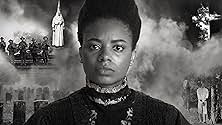Gebrandmarkt: Die wahre Geschichte des Rassismus in Amerika
Originaltitel: Stamped from the Beginning
IMDb-BEWERTUNG
6,7/10
1448
IHRE BEWERTUNG
Durch innovative Animationen und Expertenkommentare erkundet diese Doku in Anlehnung an den preisgekrönten Bestseller die Geschichte rassistischen Gedankenguts in den USA.Durch innovative Animationen und Expertenkommentare erkundet diese Doku in Anlehnung an den preisgekrönten Bestseller die Geschichte rassistischen Gedankenguts in den USA.Durch innovative Animationen und Expertenkommentare erkundet diese Doku in Anlehnung an den preisgekrönten Bestseller die Geschichte rassistischen Gedankenguts in den USA.
- Regie
- Drehbuch
- Hauptbesetzung
- Für 1 Primetime Emmy nominiert
- 2 Gewinne & 10 Nominierungen insgesamt
Leer Leary
- Abraham Lincoln
- (Synchronisation)
David Goldstein
- Boston Elite
- (Synchronisation)
Empfohlene Bewertungen
I quite like Kendi's book, and when I saw this pop up on Netflix I clicked it instantly, looking forward to see a documentary visualize the content of the book in an engaging manner.
Sadly, it's honestly harder to follow than expected, even for someone who has read the book. Williams' direction led to extreme over-editing, and the lack of captions or context for what you are looking at in the montages leads to frequent confusion and annoyance.
To be clear, I understand the logic behind Williams' editing style--but it still doesn't work. What he was going for was to try to amplify the continuities of 17th century racism to racism today, which is fitting with Kendi's main thesis. But in terms of documentary style, it goes a little 'too extra' even to that end, mixing together speeches, films, historical footage, contemporary news footage, highly stylized reenactments... to the extent that at any given montage, you could go a solid three minutes not being sure what CENTURY the footage you're looking at is coming from, let alone decade, or whether it was real footage or fiction.
If you were an educator, and wanted to have a conversation about Kendi's ideas, but hadn't assigned the full book, should you show this to your class instead? No, absolutely not -- this documentary will be annoying and confusing if you aren't already familiar with Kendi's point, and honestly, even if you agree with Kendi's thesis you might even then find much to dislike.
For instance, consider the 7 minute sequence from about 11 minutes into the documentary to the 18 minute mark, on Bacon's rebellion. Could your students answer the following questions: -What century was Bacon's rebellion in?
-What was Bacon's rebellion about?
-What was the outcome of Bacon's rebellion?
No--because Bacon's rebellion is just an incident mentioned in support of the idea that whiteness was invented to prevent poor whites from allying with poor blacks. You might be able to follow the point the documentary is trying to make, but the result is that, unless you already know the example, you would completely lose sense of historical trajectory or continuity because the documentary tells you so little contextualized information.
Now you might say--oh they didn't have time to go into all this context on the example. But they used two minutes right after introducing Bacon's Rebellion to give a four-century spanning montage of depictions of racism... instead of giving almost any basic context about the example of Bacon's rebellion or its relevance to the argument.
A lot of the montages, for that matter, feel... conspiratorial? What I mean by this is that again, they're not really making articulated connections; they're not even naming the people in the photos, so either you 'get it' or you don't--but isn't the point of a documentary to make it so that people unfamiliar with the subject will understand? There's no names given when someone's face pops up on screen, and the faces and names go by so fast even someone highly educated is likely to be left wondering "wait who was that guy..?"
Basically, even in a classroom setting where you had already read Kendi's book... I honestly feel like this documentary would do more harm to comprehension than good.
Sadly, it's honestly harder to follow than expected, even for someone who has read the book. Williams' direction led to extreme over-editing, and the lack of captions or context for what you are looking at in the montages leads to frequent confusion and annoyance.
To be clear, I understand the logic behind Williams' editing style--but it still doesn't work. What he was going for was to try to amplify the continuities of 17th century racism to racism today, which is fitting with Kendi's main thesis. But in terms of documentary style, it goes a little 'too extra' even to that end, mixing together speeches, films, historical footage, contemporary news footage, highly stylized reenactments... to the extent that at any given montage, you could go a solid three minutes not being sure what CENTURY the footage you're looking at is coming from, let alone decade, or whether it was real footage or fiction.
If you were an educator, and wanted to have a conversation about Kendi's ideas, but hadn't assigned the full book, should you show this to your class instead? No, absolutely not -- this documentary will be annoying and confusing if you aren't already familiar with Kendi's point, and honestly, even if you agree with Kendi's thesis you might even then find much to dislike.
For instance, consider the 7 minute sequence from about 11 minutes into the documentary to the 18 minute mark, on Bacon's rebellion. Could your students answer the following questions: -What century was Bacon's rebellion in?
-What was Bacon's rebellion about?
-What was the outcome of Bacon's rebellion?
No--because Bacon's rebellion is just an incident mentioned in support of the idea that whiteness was invented to prevent poor whites from allying with poor blacks. You might be able to follow the point the documentary is trying to make, but the result is that, unless you already know the example, you would completely lose sense of historical trajectory or continuity because the documentary tells you so little contextualized information.
Now you might say--oh they didn't have time to go into all this context on the example. But they used two minutes right after introducing Bacon's Rebellion to give a four-century spanning montage of depictions of racism... instead of giving almost any basic context about the example of Bacon's rebellion or its relevance to the argument.
A lot of the montages, for that matter, feel... conspiratorial? What I mean by this is that again, they're not really making articulated connections; they're not even naming the people in the photos, so either you 'get it' or you don't--but isn't the point of a documentary to make it so that people unfamiliar with the subject will understand? There's no names given when someone's face pops up on screen, and the faces and names go by so fast even someone highly educated is likely to be left wondering "wait who was that guy..?"
Basically, even in a classroom setting where you had already read Kendi's book... I honestly feel like this documentary would do more harm to comprehension than good.
This review is by someone who is not an American, but has lived in the US for 8 years during her PhD and Post-doctoral education. She is not black. I see reviews here that sometimes has nothing to do with the material, but has much to do with a person's political views. I wished to put who I am out there to say that this review is not the product of my political stance or belongingness. Here it goes:
I liked this documentary, and will rewatch it. The other reviews talk about horrible editing. It did not bother me. Sometimes, living in the moment, we don't realize that historical narratives are continuously being rewritten, and edited. It is painful to revisit a past, where there is so much pain. But it should be revisited so that we understand the root of current problems and why they are so persistent, complex and challenging. We inherit great things from our ancestor and also some things we may not be too proud of. That is OK, as long as we strive to be a better version of ourselves. This is what the documentary left me with. I enjoyed it immensely. Oh! Also I now have the urge to read more of Maya Angelou.
I rarely if ever post on this platform, but this one really went on my nerves. The perception provided in this documentary is great. The information you get is educational and at times mind blowing (especially for those ill-informed of USA history).
However, the production, editing, scene cutting, jumping from animation to another and then leaving viewers longing with the animated scenery mixed with some modern songs that just do not sit right is something that diminished the very purpose of this ever so important narrative. It is almost impossible to endure such editorial horror without some skips. I think it requires more formal and serious approach corresponding to the knowledge of acting narrators and topic itself.
However, the production, editing, scene cutting, jumping from animation to another and then leaving viewers longing with the animated scenery mixed with some modern songs that just do not sit right is something that diminished the very purpose of this ever so important narrative. It is almost impossible to endure such editorial horror without some skips. I think it requires more formal and serious approach corresponding to the knowledge of acting narrators and topic itself.
As "Stamped from the Beginning" (2023 release; 92 min.) opens, the off-camera interviewer opens with this question: "What's wrong with Black people?". The (Black) talking heads are stunned with this question. We then go back in time to when Blacks were forced (basically kidnapped) to the US. At this point we are less than 10 minutes into the documentary.
Couple of comments: this is the latest documentary from Black director Roger Ross Williams. More importantly, this is the movie adaptation of the 2016 acclaimed book of the same name by Dr. Ibram X. Kendi, who himself is among the most interviewed talking heads. Along the way we get to know some historic figures whom I was not familiar with. The documentary is fast-paced, and well illustrated, but of course at times is difficult to watch, even if it is must-see for sure. I moved to the US many years ago, and am still learning every day about the dark past (and sadly, also present) of this country.
"Stamped from the Beginning" started streaming on Netflix last week, and I just caught up with it. There is good reason why this documentary is currently rated 100% Certified Fresh on Rotten Tomatoes. If you have any interest in social justice and the correlating origins of Black racism, I'd readily suggest you check this out and draw your own conclusion.
Couple of comments: this is the latest documentary from Black director Roger Ross Williams. More importantly, this is the movie adaptation of the 2016 acclaimed book of the same name by Dr. Ibram X. Kendi, who himself is among the most interviewed talking heads. Along the way we get to know some historic figures whom I was not familiar with. The documentary is fast-paced, and well illustrated, but of course at times is difficult to watch, even if it is must-see for sure. I moved to the US many years ago, and am still learning every day about the dark past (and sadly, also present) of this country.
"Stamped from the Beginning" started streaming on Netflix last week, and I just caught up with it. There is good reason why this documentary is currently rated 100% Certified Fresh on Rotten Tomatoes. If you have any interest in social justice and the correlating origins of Black racism, I'd readily suggest you check this out and draw your own conclusion.
Must see for all to understand the real history of the United States and how it's wealth and European wealth is built on the backs and blood of Atlantic slave trade and colonization. The film is not complete but should inspire everyone esp young people to learn about institutions and systems that propagate injustice and oppression. Wars in Middle East, Africa, civil unrest, poverty, mass shootings, mass incarceration, migrant crisis etc can be better understood in light of racist doctrines and policies created by Europeans since the 16th century. Read about the Doctrine of Discovery and Age of Exploration.
Top-Auswahl
Melde dich zum Bewerten an und greife auf die Watchlist für personalisierte Empfehlungen zu.
- How long is Stamped from the Beginning?Powered by Alexa
Details
- Erscheinungsdatum
- Herkunftsland
- Offizieller Standort
- Sprache
- Auch bekannt als
- Stamped from the Beginning
- Drehorte
- Produktionsfirmen
- Weitere beteiligte Unternehmen bei IMDbPro anzeigen
- Laufzeit1 Stunde 31 Minuten
- Farbe
- Sound-Mix
Zu dieser Seite beitragen
Bearbeitung vorschlagen oder fehlenden Inhalt hinzufügen

Oberste Lücke
What is the Hindi language plot outline for Gebrandmarkt: Die wahre Geschichte des Rassismus in Amerika (2023)?
Antwort

